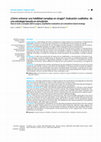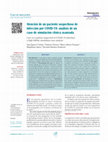Papers by juan ignacio cobian
Revista latinoamericana de simulación clínica, 2020
Atención de un paciente sospechoso de infección por COVID-19: análisis de un caso de simulación c... more Atención de un paciente sospechoso de infección por COVID-19: análisis de un caso de simulación clínica avanzada Care of a patient suspected of COVID-19 infection: a high fidelity simulation case analysis

Background: Learning complex tasks in surgical requires the coordination and integration of techn... more Background: Learning complex tasks in surgical requires the coordination and integration of technical and non-technical skills have an impact on the performance of work teams.Objective: The aim of this study is to report the results of a simulation-based educational strategy for training in complex surgical skills considering the participants’ perceptions.Material and methods: In 2019, 10 healthcare professionals participated in a 20-hour course divided in 6 hours of online training and 14 hours of onsite training. The strategy designed included the integration of case resolution activities, role-playing, practice with synthetic and virtual simulators and high-fidelity simulation. At the end of the course, a questionnaire was administered to explore participants’ perceptions on what they had learned and on their attitude changes.Results: Fifty percent of the participants perceived their skills and knowledge improved at the end of the course compared with their perception at the begi...
Revista Latinoamericana de Simulación Clínica, 2020
Atención de un paciente sospechoso de infección por COVID-19: análisis de un caso de simulación c... more Atención de un paciente sospechoso de infección por COVID-19: análisis de un caso de simulación clínica avanzada Care of a patient suspected of COVID-19 infection: a high fidelity simulation case analysis

Simulación clínica, 2020
Introduction: Simulated clinical experience allows to asses response of pre-hospital care, emerge... more Introduction: Simulated clinical experience allows to asses response of pre-hospital care, emergencies and critical care teams to a suspected case of COVID-19. Case report: A multiple environment was set, beginning at patient’s home and continued in hospital. During the analysis, a self-assessment exercise was carried out on emotions, cognitive load and self-perception of efficacy. A difference was found in the cognitive load in favor of the critical care and emergencies groups compared to pre-hospital care. All three groups expressed high self-perception of efficacy; however, a performance gap was observed in terms of prevention and control of the infection and nontechnical skills. Conclusions: We highlight the need to take cognitive load and non-technical skills into account in the design of simulated clinical experience, their role in self-perception of efficacy, and the value of translational simulation in the continuous improvement of processes for the care of COVID-19.
Uploads
Papers by juan ignacio cobian